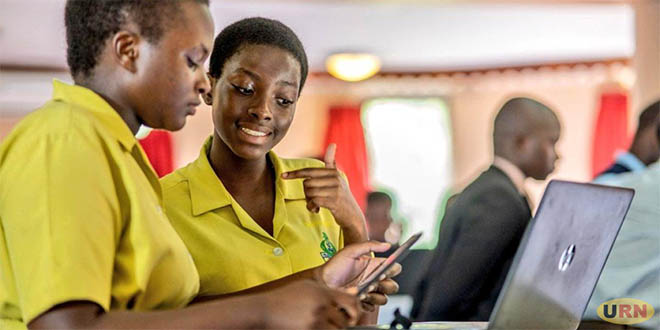
Students from Mbale SS noted that the school permits boys to carry phones, but they are only allowed for use during weekends, while at off-campus hotels, or during free time, with some locations providing Wi-Fi. However, girls are not permitted to have gadgets.
Kampala, Uganda | THE INDEPENDENT | While the Ministry of Education has placed a temporary pause on allowing mobile phones and other tech gadgets in schools, several institutions are forging their own path by creating tailored policies.
Earlier this year, the Ministry of Education launched a digital agenda aimed, among other things, at regulating the use of technology and related devices in education. Excitement grew among schools and students who saw this as a signal to allow the use of phones and other devices. In response, the ministry announced a pause, instructing schools to wait for new regulations regarding the use of phones and tech gadgets in schools.
The pause was intended to provide time for stakeholder consultations and to ensure that any new guidelines would be inclusive and universally applicable. “The decision to pause is meant to create room for schools, parents, and experts to weigh in on this sensitive matter,” said Denis Mugimba a Ministry spokesperson. “Uncoordinated measures could lead to inconsistencies and conflict.”
Despite this directive, a number of schools looking at the brighter side of the gadgets more so under the new curriculum which requires individuals and peer research have chosen to go ahead with their own rules. Our reporter has talked to students from different public and private schools to understand how they are managing and treating tech gadgets.
Students from Mbale SS noted that the school permits boys to carry phones, but they are only allowed for use during weekends, while at off-campus hotels, or during free time, with some locations providing Wi-Fi. However, girls are not permitted to have gadgets.
A female student, who wished to remain anonymous, explained that school authorities believe girls are at higher risk if they are allowed to carry phones, either at school or at off-campus hotels.
She described the school policy as discriminatory and called for it to be reviewed to ensure equal treatment for all students.
Okot Abdulshakul, the ICT President at Mbale SS, noted that students who carry smartphones or laptops are required to register them with the wardens of the different hostels. He explained that gadgets are typically handed over to the wardens during class time.
The ICT president also mentioned that students without personal gadgets can use the school-provided laptops. However, he pointed out that access to these laptops is highly competitive due to the large number of learners at the school.
Josephine Akech, an ICT teacher at Gulu SS, stated that gadgets are allowed at the school, emphasizing that “completely banning gadgets is no longer a solution.” Akech explained that at Gulu SS, any student with a personal gadget is required to register it with the school office, where it is securely stored. The gadgets are then only given to the students at designated times and are used under the supervision of teachers.
The teacher, however, noted that it would be better if the school had enough school-owned gadgets. She called on the government to equip all schools across the country with sufficient computers and related devices, as well as ensure stable internet connectivity. This, she argued, would eliminate the need for students to bring their phones, which are often difficult to supervise.
Priscilla Lalela, a student at Gulu SS, noted that supervising learners while using gadgets is in their best interest, as some students might otherwise access harmful content like pornography. She believes the school’s approach of having supervisors present when students use gadgets is a better solution than the complete bans enforced in other schools.
Lalela, however, emphasized the importance of students having access to devices such as smartphones and laptops. She highlighted that in today’s digital age, having these tools is crucial for enhancing learning opportunities, especially in subjects that require research, online resources, and digital literacy.
Learners from Nabisunsa Girls noted that the school allows students who can afford personalized laptops, which can be used at designated times to enhance their digital skills and conduct research, among other purposes. Bashir Ssuuna, ICT teacher at Nabisunsa, confirmed that the laptops are permitted, but under strict in-house rules and regulations.
He explained that students can only access the laptops during research sessions or while developing projects, among other designated times. After use, the laptops are stored in secure gadget rooms, and internet access is filtered to restrict students from visiting certain websites, including social media platforms.
With wider access to devices and skilled instructors, students at Nabisunsa are utilizing gadgets for various purposes, including research, coding, and designing their apps. Many are working on projects and developing applications that support and enhance their educational journey.
However, other schools, such as Trinity College Nabingo, have upheld the ban on phones and other related gadgets, in line with the Ministry of Education’s recommendations. Colette Ndagire Kajumba, a student at Trinity College Nabingo, noted that while they don’t have access to personal gadgets, the school-provided devices are sufficient for their needs.
She added that students interested in ICT can join special clubs, where, during free time and other designated moments, they engage in activities like coding and other tech-related projects.
The schools’ unilateral decisions have sparked mixed reactions from parents. While some applaud the proactive approach, others worry about the lack of uniformity and potential conflicts with future Ministry guidelines. Parents like Susan Nankunda, however, are supportive. “My child’s school banned phones, and I’ve already seen an improvement in his grades and focus,” she said.
The Ministry has yet to comment on the actions of these schools, but sources suggest that officials are monitoring the situation closely. As consultations continue, questions remain about how schools will adapt if future regulations conflict with their current policies. For now, schools seem determined to chart their own course, even if it means pushing back against centralized authority.
****
URN
 The Independent Uganda: You get the Truth we Pay the Price
The Independent Uganda: You get the Truth we Pay the Price


